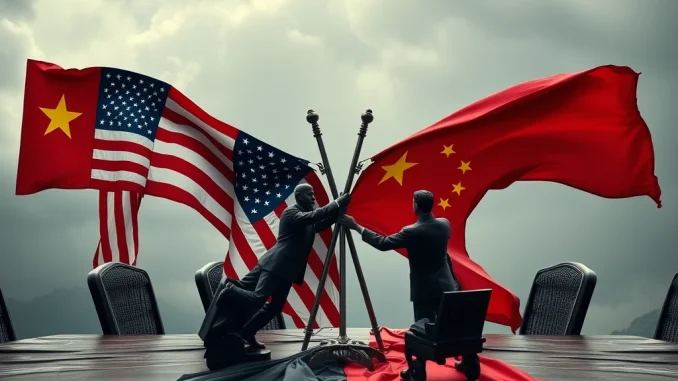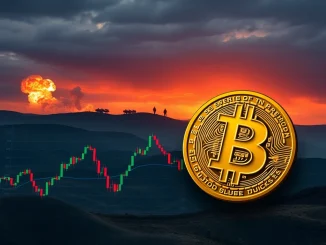
Geopolitical tensions and economic uncertainty often send ripples through financial markets, and the world of cryptocurrency is no exception. The latest development involving US-China trade talks presents a classic case of conflicting narratives that can impact market sentiment. When major global powers issue contradictory statements regarding crucial negotiations, investors worldwide take notice. This situation highlights how macroeconomic and political events, even those seemingly unrelated to digital assets, can influence the volatility and direction of the Crypto Market Reaction.
Conflicting Reports on Trump China Trade Meeting
The core of the current market uncertainty stems from opposing statements regarding recent interactions between the United States and China on trade matters. Initially, a report based on a statement from U.S. President Donald Trump suggested that a meeting concerning Trump China trade discussions had taken place earlier in the day. The President’s comment, as reported by Walter Bloomberg on X, was notably brief, stating only that a meeting occurred and dismissing the relevance of identifying ‘who they is’.
However, this claim was swiftly contradicted by Beijing. Later the same afternoon, China’s Ministry of Commerce issued a definitive denial. Their statement explicitly refuted reports of current trade negotiations with the U.S., labeling them as ‘false’. The ministry further underscored China’s position, stating that any resolution to the trade dispute must begin with the U.S. removing the unilateral tariffs it has imposed.
This direct contradiction from two major global economic players creates a significant information vacuum and fuels speculation across financial sectors.
Why Does This China Trade Denial Matter?
A China trade denial following a claim of talks isn’t just a diplomatic spat; it has tangible implications for markets. Here’s why this discrepancy is significant:
- Uncertainty Breeds Volatility: Markets dislike uncertainty. Conflicting reports make it difficult for investors to gauge the true state of trade relations and predict future policy actions. This leads to increased volatility in stocks, commodities, and currencies.
- State of Negotiations: A denial from one side, especially with a clear condition (removing tariffs), suggests that formal, productive talks are likely not underway, or at least not at the level suggested by the other side. This indicates a potential stalemate.
- Impact on Business Decisions: Businesses making long-term investment and supply chain decisions rely on predictable trade environments. This kind of public disagreement makes planning harder.
- Geopolitical Barometer: Trade is a major point of tension between the US and China. Disagreements over even the fact of talks reflect broader difficulties in the relationship.
Understanding the Global Market Impact
The back-and-forth on trade between the world’s two largest economies has a profound Global Market Impact. Here’s how:
Historically, positive news about US-China trade talks has often led to risk-on sentiment, boosting stock markets and certain commodities. Conversely, negative news, breakdowns in talks, or escalations (like tariff increases) typically trigger risk-off sentiment, causing stocks to fall, safe-haven assets (like gold or certain government bonds) to rise, and increasing overall market caution.
The current situation, with a direct contradiction, falls into the ‘negative’ or ‘uncertainty’ category. It signals potential ongoing friction rather than progress, which can weigh on investor confidence globally.
What is the Potential Crypto Market Reaction?
While not directly tied to tariffs on goods, the Crypto Market Reaction is often correlated with broader global market sentiment. Here’s how this US-China trade news could potentially influence crypto:
- Correlation with Risk Assets: Bitcoin and other cryptocurrencies are increasingly viewed and traded as risk assets by institutional investors. When traditional markets experience risk-off sentiment due to geopolitical or economic uncertainty (like trade disputes), crypto markets can also see sell-offs.
- Flight to Safety? In extreme cases of market turmoil, some investors might seek alternatives. While gold is a traditional safe haven, some proponents argue for Bitcoin as ‘digital gold’. However, this narrative is still developing, and Bitcoin has frequently dropped alongside stocks during periods of stress.
- Volatility Increase: Uncertainty naturally leads to increased volatility. Traders may react impulsively to news headlines, whether confirmed or denied, leading to sharp price swings in cryptocurrencies.
- Focus Shifts: Major global economic news can sometimes overshadow crypto-specific developments, shifting market focus and potentially impacting trading volumes and price discovery.
It’s important for crypto enthusiasts to recognize that the digital asset market doesn’t exist in a vacuum. It’s influenced by the same global forces that affect traditional finance.
Challenges and Path Forward for US-China Trade
The core challenge in resolving the US-China trade dispute remains significant. China’s explicit condition – the removal of unilateral tariffs – highlights a major sticking point. The U.S., having used tariffs as leverage, may be reluctant to remove them without substantial concessions from China on issues like intellectual property, forced technology transfer, state subsidies, and market access.
Potential paths forward could include:
- Quiet, informal discussions that aren’t publicly announced or are even denied.
- A change in political stance from either side.
- Continued stalemate, with tariffs remaining in place and sporadic public disagreements.
- A de-escalation driven by economic necessity on either side.
The current public denial suggests that the path towards formal, productive US-China trade talks is currently blocked by fundamental disagreements on preconditions.
Actionable Insights for Crypto Holders
Given the potential Global Market Impact and subsequent Crypto Market Reaction to news like this, what can crypto holders do?
- Stay Informed: Pay attention to major global economic and geopolitical news, not just crypto-specific headlines. Understand how events like trade disputes can influence overall market sentiment.
- Manage Risk: Be aware that periods of global uncertainty can lead to increased volatility in crypto. Ensure your portfolio is aligned with your risk tolerance.
- Avoid Knee-Jerk Reactions: Conflicting reports can cause rapid, emotional trading. Take a moment to assess the news and its potential impact before making trading decisions.
- Consider the Long Term: For long-term investors, short-term volatility driven by macroeconomic news might be less concerning than for active traders.
This situation serves as a reminder that external factors significantly influence the crypto landscape.
Summary: Navigating Uncertainty in the Wake of China Trade Denial
The news surrounding the alleged Trump China trade meeting and the subsequent definitive China trade denial by the Ministry of Commerce underscores the ongoing tension and lack of clear communication in US-China trade talks. This public contradiction injects fresh uncertainty into the global economic outlook. As history shows, such uncertainty has a tangible Global Market Impact, often leading to increased volatility and a shift towards risk-off sentiment in traditional finance.
For those involved in digital assets, understanding this dynamic is crucial. The Crypto Market Reaction is increasingly intertwined with these broader macroeconomic forces. While the denial doesn’t directly affect the fundamentals of blockchain technology, it contributes to the overall market environment that influences price movements. Staying informed about these significant geopolitical and economic developments is essential for navigating the complex and interconnected world of global markets and cryptocurrency.



